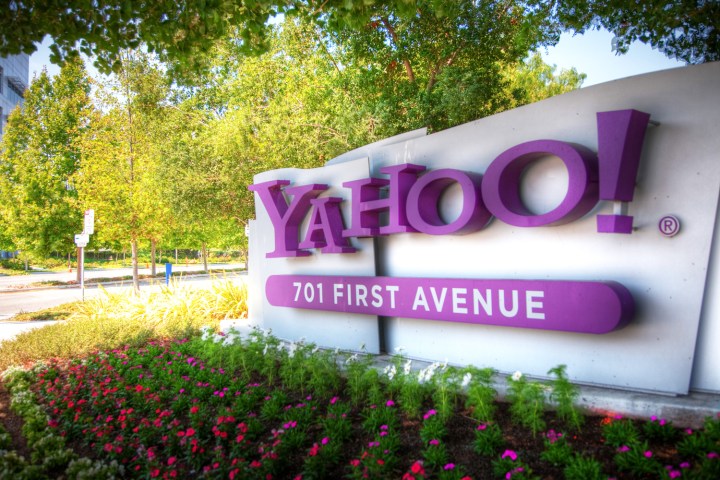
Marissa Mayer
When Verizon and Yahoo announced the acquisition, Yahoo CEO Marissa Mayer assured employees that despite the acquisition, she wasn’t going anywhere.
“I’m incredibly proud of everything that we’ve achieved, and I’m incredibly proud of our team,” said Mayer. “For me, personally, I’m planning to stay. I love Yahoo, and I believe in all of you. It’s important to me to see Yahoo into its next chapter.”
This contradicted previous reports suggesting that Mayer would be granted a $57 million exit package. While she is expected to continue in her main role, at the beginning of 2017, documents related to the acquisition revealed Mayer will not continue to serve on the new company’s board of directors once the acquisition is complete. Several other executives will also resign from the board.
What will be left?
Yahoo will still exist once the sale to Verizon goes through, and the new company will be known as Yahoo Altaba, according to documents released in January 2017. Yahoo isn’t selling its most lucrative asset — stock in internet retailer Alibaba. The company paid $1 billion for a 30-percent stake in the company in 2005, half of which it returned in 2012. The company’s remaining investment has paid dividends: It’s now worth north of $25 billion. Yahoo will also retain a 35 percent stake in Yahoo Japan
Yahoo’s board sees its core business sell-off as a springboard for revitalization.
Verizon
Verizon officially confirmed the deal in July 2016, with its Chairman and CEO Lowell McAdam stating, “Just over a year ago we acquired AOL to enhance our strategy of providing a cross-screen connection for consumers, creators, and advertisers. The acquisition of Yahoo will put Verizon in a highly competitive position as a top global mobile media company, and help accelerate our revenue stream in digital advertising.”
A massive $4.83 billion will be paid in cash by Verizon for Yahoo, when it’ll be integrated with AOL under the supervision of Verizon’s president of product and business, Marni Waldren. It purchased media company AOL for $4.4 billion in 2014, a deal that included The Huffington Post and tech blog Engadget.
However, while the deal is expected to be completed during the first three months of 2017, there are concerns the data breaches that made international headlines through the second half of 2016 could scupper the acquisition entirely. Waldren has stated the impact of the breaches is still being studied, and is said to be unsure if it should proceed with the purchase.
Deal history
While Yahoo met with Dan Gilbert, CEO of Quicken Loans, and a group of investors as recently as last Thursday, and reportedly entertained offers from private-equity firm TPG, that potential deal and others were dropped in favor of Verizon. Back in December, the carrier’s chief financial officer, Fran Shanmo, expressed a willingness to consider buying Yahoo’s business.
The prime draw is Yahoo’s lucrative media and advertising properties. Yahoo Japan, a sprawling Asian culture web portal that’s the product of a joint venture between Yahoo and Japanese internet company SoftBank, has been appraised at nearly $9 billion. Yahoo’s various internet ventures, meanwhile — which include search, Yahoo Mail, and online publications like Yahoo Tech and Yahoo Finance — are worth an estimated $5 billion to $8 billion. And despite a dip in net revenue this year, Yahoo’s advertising division remains one of the largest and most profitable on the web: This year, it’s projected to generate $2.83 billion and command a 1.5 percent share of the online ad market.
Future plans
Yahoo has a strong brand, and plenty of smaller businesses under its name, so what will happen to them all? According to Recode, Verizon intends to merge Yahoo and AOL’s advertising networks to challenge rivals like Facebook and Google. It will face an uphill battle — AOL had an estimated 3.3-percent share of the ad market in 2016, compared to Google and Facebook’s combined 64 percent — but Verizon executives are reportedly bullish on the resiliency of Yahoo’s brand and built-in user base.
The company’s Mail service has more than 280 million users, and it retains a 12.6-percent share of the desktop search market in the U.S., but after the massive data breaches revealed after the acquisition announcement, the number of people using the service is likely to have tumbled.
For Yahoo, the sale is part of what CEO Marissa Mayer called a “multiyear transition” to a “more focused” operation as the company struggles to rebound from years of unprofitability. Yahoo’s web properties, which collectively remain among the most visited in the United States with more than 200 million monthly visitors, reported an 11 percent year-over-year decline in revenue during the company’s most recent earnings call. Yahoo laid off 1,000 employees, or about 10 percent of its workforce, in the first quarter of this year.
Analysts blame much of Yahoo’s recent travails on its failure to transition to mobile. In the first quarter of 2016, the company made just $250 million in revenue from smartphone and tablet users. Facebook, by comparison, made $4.5 billion in the fourth quarter of 2015.
Ballooning costs didn’t help. Thanks to such investments as $20 million for rights to the National Football League’s first streaming-only game broadcast (the Buffalo Bills versus the Jacksonville Jaguars) and the $160 million acquisition of shopping site Polyvore, the company’s expenses climbed an average of 21 percent in 2015.
Perhaps unsurprisingly, more cost-cutting is in the company’s future. Future downsizing will include selling off Yahoo’s real estate in Burbank and Santa Clara, California, Dubai, and Milan; unloading unused patents; and shuttering up to seven digital publications in categories like parenting, food, and travel. And the company intends to lay off 15 percent of its 11,000 staffers in the coming months.
Article originally published by Kyle Wiggers. Lulu Chang and Andy Boxall have both contributed to the report. Updated on 01/10/2017 by Andy Boxall: Added in news Marissa Mayer will not serve on new company’s board.


